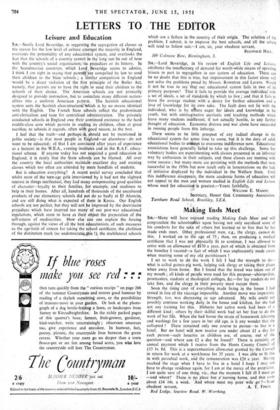SIR,—Lord Beveridge, in his review of English Life and Leisure,
attributes the insufficiency of demand for worth-while means of spending leisure in part to segregation in our system of education. There can be no doubt that this is true, but improvement in this factor alone will not solve the problems posed by Messrs. Rowntree and Lavers. Would it not be true to say -that our educational system fails in two of its primary purposes? That it fails to provide the average individual with a set of ideals, a set of standards by which to live ; and that it fails to leave the average student with a desire for further education and a love of knowledge for its. own sake. The fault does not lie with the individual, who is by nfture eager for ideals and knowledge in his youth, but with unimaginative curricula and teaching methods which leave many students indifferent, if not actually hostile, to any further thought of education. Economic distress and war alone have succeeded in rousing .people from this lethargy.
There seems to be little prospect of any radical change in the educational system for some time to come, but it is the duty of adult educational bodies to atlimpt to overcome indifference now. Educational associations have generally failed to take up this challenge. Some few voluntary bodies are experimenting with classes presented in an informal way by enthusiasts in their subjects, and these classes are meeting with some success ; but many more are persisting with the methods that were successful in the 1930s but now result only in lamentations on the lack of initiative displayed by the individual in the Welfare State. Until this indifference disappears, the more academic forms of education will not appeal to the men and women studied- in English Life and Leisure whose need for education is greatest.—Yours faithfully, 7. WILLIAM E. MASON, Secretary, Honor Oak Community Association. Turnham Road School, Brockley, S.E.4.


































 Previous page
Previous page